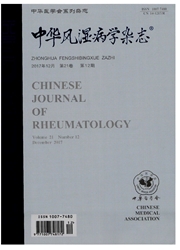

 中文摘要:
中文摘要:
目的探讨Ⅰ型干扰素(IFN)诱导基因(IFIG)的表达与系统性红斑狼疮(SLE)的临床相关性。方法实时定量聚合酶链反应(PCR)检测67例SLE患者及23名健康对照外周血白细胞中5个IFIG(OAS-1、Mx-1、Ly6e、IFIT1和IFIT4)的mRNA水平,计算IFN积分,并与相应临床资料进行统计学分析;随机挑取17例患者采用荧光素酶报告基因测定其血清IFN活性并与IFN积分行相关分析。结果IFN积分在SLE患者中显著增高,并与血清IFN活性及SLE疾病活动指数(SLEDAI)-2K积分呈显著正相关,与补体C3水平呈负相关。此外,抗Sm、抗RNP抗体阳性的患者中存在IFN积分显著升高。结论IFN积分与血清IFN活性密切相关,与SLE的疾病活动性及特定自身抗体表型相关,是反映SLE活动的新的生物标志物。
 英文摘要:
英文摘要:
Objective To correlate the expression levels of interferon inducible genes (IFIGs) with disease activity and clinical features in systemic lupus erythematosus (SLE) patients. Methods Peripheral blood cells obtained from 67 SLE patients and 23 healthy donors (HDs) were subjected to real-time PCR to measure the transcriptional levels of five IFIGs (OAS-1, Mx-1, Ly6e, IFIT1 and IFIT4). Interferon scores were calculated and were compared between various groups of SLE patients as well as between patients and controls; ISRE luciferase reporter gene activity was measured in 17 of 67 patients and correlated with interferon score. Results Interferon scores were strongly correlated with ISRE reporter gene activity, which represented for the type I interferon activity in serum. The expression levels of IFIGs and interferon scores were significantly elevated in SLE patients compared with HDs (P〈0.0001). Interferon scores were correlated positively with SLEDAI-2K (P=0.0006) and negatively with C3 levels (P=0.0162). Interferon scores were also significantly elevated in SLE patients with a positive anti-Sin or anti-RNP autoantibodies. Conclusion The interferon score may be regarded as a good indicator for serum type Ⅰ interferon activity in SLE and serves as a new biomarker for disease activity in SLE patients.
 同期刊论文项目
同期刊论文项目
 同项目期刊论文
同项目期刊论文
 期刊信息
期刊信息
